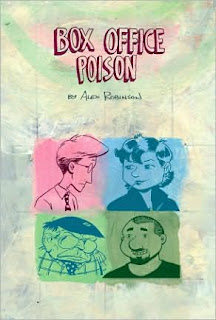 Box Office Poison was conceived in the mid-'90s and published from 1996 through 2000; it's now an artifact of a slightly outdated world, one where cell phones are rare, CD chains are booming, and the Internet barely merits a mention. But it's also from a different era of ambitious graphic novels, one where almost every story had a connection to comics or cartooning itself. (Comics haven't entirely stopped looking into their own navel these days, of course, but there are regularly major important works -- Bottomless Belly Button, Three Shadows, Blankets -- that aren't about comics or cartoonists or the author's thinly-veiled life in any way.)
Box Office Poison was conceived in the mid-'90s and published from 1996 through 2000; it's now an artifact of a slightly outdated world, one where cell phones are rare, CD chains are booming, and the Internet barely merits a mention. But it's also from a different era of ambitious graphic novels, one where almost every story had a connection to comics or cartooning itself. (Comics haven't entirely stopped looking into their own navel these days, of course, but there are regularly major important works -- Bottomless Belly Button, Three Shadows, Blankets -- that aren't about comics or cartoonists or the author's thinly-veiled life in any way.)Box Office Poison is definitely big and ambitious, a six-hundred page graphic novel with a central cast of about a half-dozen and a supporting cast three or four times as large, over the course of about a year. (Major holidays and events only come up once in the course of the book, but the main plot of the book seems to run from the late summer of 1994 through all of 1995 and into the convention season (probably the summer) of 1996.)
The cover pegs the center of Box Office Poison quite cleverly -- it's the story of two relationships, of Sherman Davies with his girlfriend Dorothy Lestrade and of Ed Velasquez with his boss Irving Flavor. Sherman and Ed are best friends just graduating from Hunter College in NYC as the story opens; Sherman has recently broken up with his college girlfriend Sally and Ed has never had a serious relationship (or made any serious effort to get out from under his extended family's thumb). On the other hand, Ed is more serious about his career -- he's created a full graphic novel at college (though it probably isn't very good) and tries to get major house Zoom to publish it, while Sherman has worked in the same bookstore as a clerk for the past several years, loathing it the whole time and being a mediocre-at-best employee.
So Sherman gets a new girlfriend, and at the same time moves into a new apartment (out in Park Slope, Brooklyn) with history professor Stephen Gaedel and his girlfriend, cartoonist Jane Pekar. The complication is that Stephen and Jane's old roommate was Dorothy, Sherman's new girlfriend, and Jane in particular doesn't like Dorothy at all.
On the other side, Ed is referred by Zoom into a semi-apprenticeship with aged comics creator Irving Flavor, who created the Batman-esque Nightstalker back during the Golden Age. As Ed works for Irving -- mostly on low-end illustration jobs, like fliers and small ads, he convinces Irving to stand up to Zoom and demand that it "do right" by him. (This is the era before the Sonny Bono copyright act, so there was no possibility of actually legally reclaiming an old property that was signed away to a big company -- only the hope of shaming a company making millions off the long-ago work of a now-old and near-destitute man into tossing that man some money.)
Box Office Poison doesn't have a conventional plot; it meanders forward through the lives of those characters -- and several others, including the head of Zoom, some comics journalists who get involved in Irving's fight, and several other friends and co-workers of Sherman's -- over the course of those months, with the progress of the Sherman-Dorothy relationship and Irving's battle against Zoom being the most central aspects. Robinson has a fine ear for dialogue -- which is reasonably common in comics -- but also has something better: a sense of how to dramatically shape everyday events and conversations into the building blocks of a larger story, and how to show character through action and dialogue.
I haven't yet read Robinson's sophomore graphic novel, Tricked (it's on the pile, with so much else) -- though I did see, and review, his 2008 book Too Cool To Be Forgotten -- so this opinion may have to be amended in the future, but, so far, it looks like Box Office Poison is his masterwork: it's long but completely integrated, containing many different stories while pulling them all into one. It has its flaws -- there's a lot of mid-period Dave Sim influence that Robinson hadn't fully digested, for example, and the comics plot gets preachy, over-the-top and derivative at times -- but it's a drawn book that depicts real lives, with all of their ups and downs, and real people, flawed and confused and contradictory as they are.
Book-A-Day 2010: The Epic Index
----------------
Listening to: The Arrogants - Hardly Perfect But Worth It
via FoxyTunes
1 comment:
I picked this up a few years back and concur; it's a fine story and worth digging into.
Post a Comment